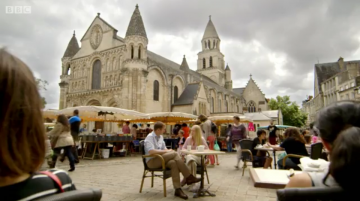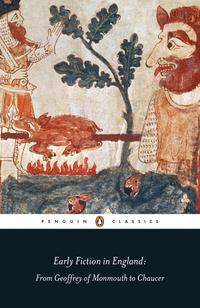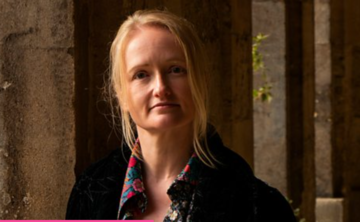Professor Laura Ashe
Medieval literature, history and culture, c. 1000-1550
♦ England's French, Latin, and English literatures
♦ The invention of fiction and rise of romance
♦ Interiority, subjectivity, and individuality, in literature and thought
♦ Ethics and moral philosophy in literature
♦ Chaucer and the Ricardian period
♦ Chivalry and kingship in culture and literature
♦ Arthurian literature and historiography, 1100-1600
♦ Medieval theology, affective piety, and confessional cultures
♦ Early Tudor literature and the court of Henry VIII
♦ National identities and ideologies in the Middle Ages
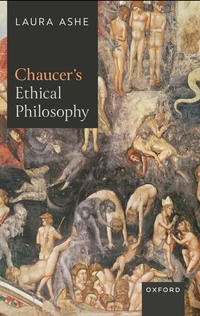
I work on literature, history, culture and ideas across the Middle Ages from the tenth to the seventeenth century, with a focus on England and its neighbours. My latest book is Chaucer's Ethical Philosophy (Oxford University Press, 2025). This develops new readings of Chaucer, demonstrating his deep affinities with modern and current philosophies of subjectivity, recognition, and ethical agency. I'm now working on a commissioned essay for a special issue of the journal New Literary History, “Moral Philosophy, Literature, and Literary Study”; this will be a study of Thomas Wyatt's ethics of love.
My early research focused on the multilingual, French, Latin and English literary environment of post-Conquest England; Fiction and History in England, 1066-1200 (Cambridge University Press, 2007), examined ideologies of national identity and imperialism, the genres of romance and chronicle, and the first colonial discourses of the English in medieval Ireland. In The Oxford English Literary History vol. 1. 1000-1350: Conquest and Transformation (Oxford University Press, 2017), I offered new interpretations of the great changes of the high middle ages as a whole, in both religious and secular cultures: the period's new explorations of interiority and individuality; the emergence of affective spirituality; the efflorescence of chivalry; the development of fiction and the love-plot; ideologies of kingship, war, historiography, and identities.
In 2015 I published Early Fiction in England: From Geoffrey of Monmouth to Chaucer, a Penguin Classics volume of high medieval texts in new translations and editions, intended both for students and the general reader. As an interdisciplinary historian I've contributed a volume to the Penguin Monarchs series, Richard II (2016), and in 2020 published Conquests in Eleventh-Century England: 1016, 1066, co-edited with Emily Ward of Cambridge. Other co-edited volumes include The Exploitations of Medieval Romance (2010), with Judith Weiss and Ivana Djordjevic; War and Literature (2014), with Ian Patterson; and Medieval and Early Modern Religious Cultures (2019), a festschrift for Vincent Gillespie, with Ralph Hanna. My work has supported by a Philip Leverhulme Prize in 2009, a Leverhulme Research Fellowship in 2015, and the Morton Bloomfield Visiting Fellowship at the English Department of Harvard University in 2016.
Looking forward, I'm now working towards a major project with a wider period purview: a history of love.
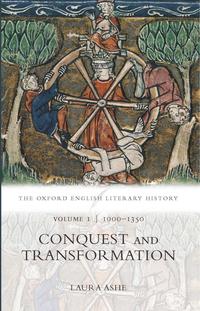
I am one of the editors of New Medieval Literatures: NML 25 (2025) was published in April, NML 26 is in production, and we're currently accepting submissions for NML 27 and beyond.
Select articles and book chapters (see also the Symplectic-linked list of publications to the right):
- '"Troilus can afford to fall in love ... with whomsoever he will": Free Will and Recognition in Troilus and Criseyde', in Form and Power in Medieval and Early Modern Literature: A Book for James Simpson, ed. Daniel G. Donoghue, Sebastian Sobecki, and Nicholas Watson (Cambridge: D. S. Brewer, 2024), 67-84.
- '"For love and for lovers": The Origins of Romance', in The New Cambridge Companion to Medieval Romance, ed. Roberta L. Krueger (Cambridge: Cambridge University Press, 2023), 14-28.
- 'Historical and Political Changes: The Norman Conquest to the Hundred Years' War', in The Oxford History of Poetry in English, vol. 2: Medieval Poetry, 1100-1400, ed. Helen Cooper and Robert R. Edwards (Oxford: Oxford University Press, 2023), 15-37.
- 'The Norman Rule', in The Routledge Companion to Medieval English Literature, ed. Raluca Radulescu and Sif Rikhardsdottir (New York: Routledge, 2023), 162-72.
- 'English', in Literary Beginnings in the European Middle Ages, ed. Mark Chinca and Christopher Young (Cambridge: Cambridge University Press, 2022), 69-89.
- '"All this will not comfort me": Romancing the Ballad in The Squire of Low Degree', in Cultural Translations in Medieval Romance, ed. Victoria Flood and Megan G. Leitch (Cambridge: D. S. Brewer, 2022), 227-43.
- 'How to read both: the logic of true contradictions in Chaucer's world', Studies in the Age of Chaucer 42 (2020), 111-46.
- 'The Originality of the Orrmulum', Early Middle English 1.1 (2019), 35-54.
- ‘“The curelesse wound”: Henry Howard, earl of Surrey, and the poetry of blood’, in Manuscript and Print in Late Medieval and Early Modern Britain: Essays in Honour of Professor Julia Boffey, ed. Tamara Atkin and Jaclyn Rajsic (Cambridge: D. S. Brewer, 2019), 241-60.
- 'The Invention of Fiction’, History Today (February 2018).
- ‘The Ideal of Knighthood in English and French Writing, 1100-1230: Crusade, Piety, Chivalry and Patriotism’, in Writing the Early Crusades: Text, Transmission, and Memory, ed. Marcus Bull and Damien Kempf (Woodbridge: Boydell, 2014), 155-68.
- ‘Language’, in A Handbook of Middle English Studies. Wiley-Blackwell Critical Theory Handbooks, ed. Marion Turner (Oxford: Wiley-Blackwell, 2013), 379-95.
- ‘The Anomalous King of Conquered England’, in Every Inch a King: Comparative Studies on Kings and Kingship in the Ancient and Medieval Worlds, ed. Charles Melville and Lynette Mitchell (Leiden: Brill, 2012), 173-93.
- ‘Holinshed and mythical history’, in The Oxford Handbook of Holinshed's Chronicles, ed. Ian W. Archer, Felicity Heal and Paulina Kewes (Oxford: Oxford University Press, 2012), 155-71.
- ‘Harold Godwineson’, in Heroes and Anti-Heroes in Medieval Romance, ed. Neil Cartlidge (Cambridge: D.S. Brewer, 2012), 59-80.
- ‘Mutatio dexterae Excelsi: Narratives of Transformation after the Conquest’, Journal of English and Germanic Philology 110 (2011), 141-72.
- ‘Introduction’ and ‘Sir Gawain and the Green Knight and the Limits of Chivalry’, in The Exploitations of Medieval Romance, ed. Laura Ashe, Ivana Djordjević and Judith Weiss (Cambridge: D. S. Brewer, 2010), 1-14; 159-72.
- 'The Hero and his Realm in Medieval English Romance', in Boundaries in Medieval Romance, ed. Neil Cartlidge (Cambridge: D. S. Brewer, 2008), 129-47.
- 'William Marshal, Lancelot, and Arthur: chivalry and kingship', Anglo-Norman Studies 30 (2008 for 2007), 19-40.
- 'Reading like a clerk in The Clerk's Tale', Modern Language Review 101 (2006), 935-44.
- '"Exile and Return" and English Law: The Anglo-Saxon Inheritance of Insular Romance', Literature Compass 3 (2006), 300-17.
- 'The Meaning of Suffering: Symbolism and Anti-Symbolism in the death of Tristan', in Writers of the Reign of Henry II: Twelve Essays, ed. Ruth Kennedy and Simon Meecham-Jones (Basingstoke: Palgrave-Macmillan, 2006), 221-38.
- 'The Short Charter of Christ: an unpublished longer version, from Cambridge University Library MS. Add. 6686', Medium Aevum 72 (2003), 32-48.
Undergraduate: Early Medieval Literature, 650-1350; Late Medieval Literature, 1350-1550; Shakespeare; comparative literatures 1000-1550; Tragedy, from Aeschylus to the present day.
Graduate teaching and research supervision: I offer options on the high middle ages and beyond for the MSt courses in Medieval Literature and Medieval Studies, and regularly supervise MSt dissertations in a great variety of fields.
I welcome prospective doctoral students wishing to work on any aspect of literary history from the tenth to the sixteenth centuries, and particularly on the multiple literatures of England; on Chaucer; on medieval (and interaction with modern) philosophy and ethics; on the literatures of kingship, chivalry and aristocratic culture; on the rise of interiority and individuality in literature and culture; on the relation of Church and society; on Arthurian literature throughout the Middle Ages; on national and community identities, medieval imperialism and postcolonialism; on medieval romance, and questions of genre; on chroniclers and historiographies.
I am currently supervising four doctoral research students: on multilingualism and translation in the high middle ages; on heraldic and chivalric culture from the fourteenth to the sixteenth century; on cups, oaths, and rituals in pre- and post-Conquest literature; and on monstrous representations of Jews in late medieval England.
Past graduate students: Completed D.Phils include Dr Emma-Catherine Wilson, 'Confessors of Arms: Heralds and their Texts in Late Medieval Chivalric Culture' (2025); Dr Michael Angerer, 'Translatable Histories: Multilingualism, Verse Translation and Identity in Medieval England' (2025); Dr Felicity Brown, 'Performing the Arthurian Legend in Late Elizabethan and Early Jacobean England, c. 1575-1610' (2023); Dr Lucy Brookes, 'The Subject of Romance' (2021); Dr Emily Dolmans, 'Regional Identities and Cultural Contact in the Literatures of Post-Conquest England' (2017); Dr Daniel Reeve, 'Romance and the literature of religious instruction, c.1170–c.1330' (2015); Dr Liliana Worth, 'Exile-and-Return in Medieval Vernacular Texts of England and Spain, 1170-1250' (2014); Dr Emily A. Winkler (History), 'Royal Responsibility in Post-Conquest Invasion Narratives' (2013); Dr Jaclyn Rajsic, 'Britain and Albion in the Mythical Histories of Medieval England' (2012), and Dr Alexander Rhodes, 'Narrative and Knowledge Transmission in Anglo-Saxon and Post-Conquest Literature' (2012).
I am a regular on BBC Radio 4's In Our Time, contributing to episodes about 'Sir Thomas Wyatt' (May 2024), The Song of Roland (November 2021), Piers Plowman (October 2020); Sir Gawain and the Green Knight (December 2018); 'Thomas Becket' (December 2017); 'Purgatory' (May 2017); 'The Twelfth-Century Renaissance' (October 2016); Tristan & Iseult (December 2015); Beowulf (March 2015); 'Chivalry' (February 2014); and Malory's Le Morte Darthur (January 2013).
My most recent TV appearance was as an expert interviewee on the unremittingly highbrow Cunk on Earth, on BBC 2 September 2022. In April 2022 I appeared in Art That Made Us, a flagship series for BBC 2 celebrating 100 years of the BBC. During the first Covid-19 lockdown I made an archival documentary for BBC4, looking at the history of the plague in light of our experience with coronavirus: Plague Fiction (BBC4, September 2020).
Just before the first Covid lockdown I was interviewed by Simon Armitage in The Poet Laureate Has Gone to His Shed, now available as a podcast.
Besides appearances on Radio 4's Front Row, Start the Week and Saturday Review, my own radio programmes include A Cultural History of the Plague (BBC Radio 3, 2014), and The Birth of Love (BBC Radio 4, 2014).
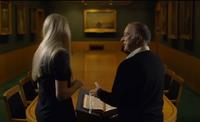
Television appearances as an interviewee include the ground-breaking documentaries Cunk on Britain (BBC2, 2018), and Danny Dyer's Right Royal Family (BBC1, 2019). I have been an expert interviewee on a Time Team special on the location of the Battle of Hastings, '1066: The Lost Battlefield' (Channel 4, 2013); A N Wilson's programme on C S Lewis, 'Narnia's Lost Poet' (BBC4, 2013); 'The Greatest Knight', a documentary on William Marshal (BBC2, 2014); a three-part series on the Norman Conquest, '1066: A Year to Conquer England' (BBC2, 2017), Front Row Late, discussing the boundaries between history and fiction (BBC2, 2019); and 'Mystic Britain', talking about King Arthur (BBC4, 2020).
Also available are an Oxford University podcast about my research, and a public lecture on the birth of the romance delivered to accompany the Romance of the Middle Ages exhibition at the Bodleian Library in 2012.
In September 2016 I was a Lansdowne Visiting Speaker at the University of Victoria, Vancouver Island, BC, delivering a keynote lecture at the 'Making Early Middle English' conference.
In November 2013 I delivered the Dorothy Ford Wiley Crossroads Lecture in Medieval Studies at the University of North Carolina, Chapel Hill.
